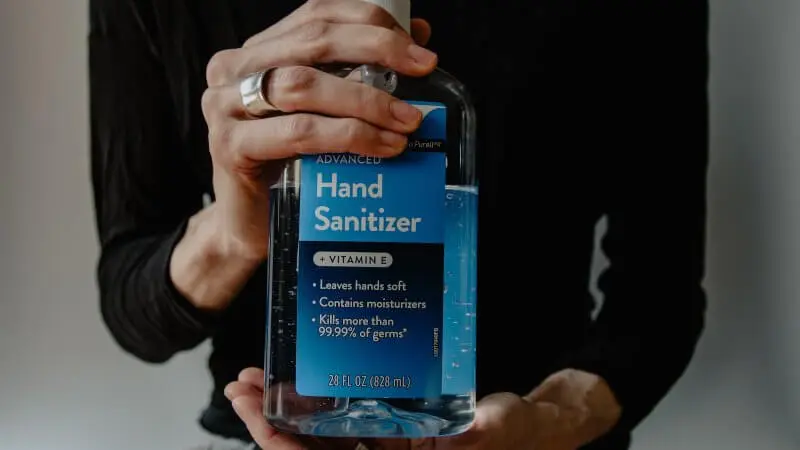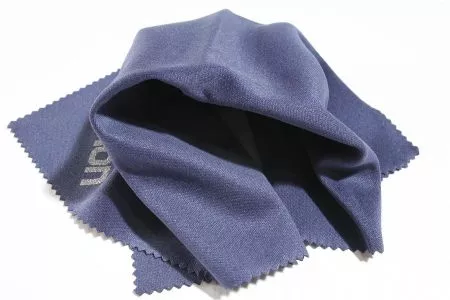If you were requested to randomly pick five clothes from your wardrobe and then read the care label to find out the fabrics used in those clothing items, 3 out of the five clothes most likely contain polyester. According to Cristina et al., polyester has become popular to the extent that over 50% of the fabrics sold worldwide comprise polyester. On the other hand, One Green Planet notes that 60% of our clothes are made from polyester. If some of your polyester garments are tight-fitting, you will ask whether polyester is stretchy.
As a synthetic fiber mainly made from ethylene derived from petroleum, polyester is not naturally stretchy since its fibers are rigid and inflexible. However, when polyester is crimped (molding polyester fibers into a wavy pattern to allow room to stretch), it can be stretchy. However, crimping polyester is an elaborate and expensive process.
Polyester fibers are often blended with other fibers with high elastic properties such as spandex, lycra, or elastane to make polyester stretchy.
In this article, I discuss what a stretchy fabric is, whether polyester is stretchy, whether polyester blends stretch and the extent to which polyester might stretch. Thus, by reading the article in full, you will have a good understanding of polyester stretchability.
- Overview of Polyester
- What is a Stretchy Fabric?
- Is 100% Polyester Stretchy?
- How Much Does Polyester Stretch?
- Can Polyester Be Stretched Out?
- Does Polyester Stretch In Water?
- Does Polyester Stretch In The Wash?
- Does Polyester Stretch After Washing?
- Does Polyester Stretch In The Dryer?
- Does Polyester Stretch More Than Cotton?
- Is Polyester Stretchy In Dresses?
- Is Polyester Stretchy In Jeans?
- Is Polyester Stretchier Than Spandex?
- Is Polyester Jeans Stretchy
- Does Polyester In Jeans Stretch?
- Is Polyester Blend Stretchy?
- Is 95% Polyester Stretchy?
- Is Polyester And Cotton Stretchy?
- Is Recycled Polyester Stretchy
- What Is 4 Way Stretch Polyester Fabric?
- Conclusions
Overview of Polyester
The term polyester is coined from two words – poly and ester. Poly implies many, while ester implies a basic organic chemical compound. There are three different types of polyester, as discussed below.
Ethylene polyester – is the most common type of polyester available in the market and is abbreviated as PET. It is made from ethylene which is found in petroleum.
Plant-based polyester – This type of polyester is made from plants, thus making this type of polyester a natural fiber. However, plant-based polyester is expensive to make and is also less durable.
PCDT Polyester is made from petroleum, and even though it has high elasticity than PET and lasts longer, it is not as popular as PET. However, PCDT polyester is commonly used in heavy-duty applications such as making curtains and upholstery.
To make polyester, PET plastic pellets are first melted. The melted pellets material is kept hot and then extruded through tiny holes to create long threads. The long threads are then melted and extruded through tiny holes to create long threads. Finally, the long threads cool and harden to become polyester fibers.
Polyester is a versatile material loved for its durability, moisture-wicking, ability to dry fast, resistant to stains, shrinking resistance, affordability, versatility, lightweight, and recyclability. Polyester also resists UV. However, polyester has different weaknesses since; it is less breathable, pollutes the environment, can irritate the skin as it does not have a soft texture, is not breathable, not stretchy, and can quickly melt.
To capitalize on polyester’s strengths, the fabric is usually blended with other natural and synthetic fabrics rich in properties that polyester lacks. For example, polyester is blended with cotton to form a versatile and breathable fabric that; doesn’t wrinkle easily, is easier to wash and dry, and can be easily dyed. Indeed, a garment made of materials like cotton alone will easily wrinkle and is not durable.
On the same note, polyester is blended with stretchy fibers such as spandex to make polyester-spandex fabric that is durable and stretchy. The blending of polyester and spandex results in high-grade fabric preferred in the manufacturing of leggings, swimwear, workout clothes, and athletic wear. Any garment made of such a blend holds its shape and won’t stretch. In addition, the blend is soft and stretchy.
What is a Stretchy Fabric?
Stretchy fabric is a fabric that is capable of stretching. To determine whether a fabric is stretchy or not, its ability to extend without damage and the extent to which the fabric gets back to its initial shape after extending in length has to be considered.
As far as fabric’s ability to extend without damage is concerned, it entails the extent to which the fabric will stretch either vertically or horizontally without the fabric’s fibers being damaged. For example, a fabric that is 200cm in length and has a 25% vertical stretch factor can have its length stretched up to 250cm without damaging the fabric. Nevertheless, you will hardly find the stretch percentage stated on your care label.
Given the extent to which the fabric gets back to its original size and shape after being extended in length, stretch entails the pull-back when the fabric is stretched. Therefore, it plays a significant role in assisting the fabric get back to the original state that it was in before being stretched.
The extent of stretchiness is determined by how tight the knits are for knit fabrics. Loose knits will be more stretchy than tight knits. For woven fabrics, they are mainly nonstretchy unless they have been blended with stretchy fabrics. Nevertheless, woven fabrics have some stretch along the diagonal of the weave, which is referred to as bias.
When clothes are made from non-stretchy fabrics, one needs to be careful not to stretch the clothing since if the clothing stretch, the clothing will most likely lose their shape. For this reason, many woven fabrics such as sweaters should be dried on a flat surface once they have been washed and then folded for storage instead of hanging since they can be stretched from the weight that pulls them down if hanged.
Is 100% Polyester Stretchy?
The properties of the fibers of any fabric and how the fibers are either knitted or woven are the two factors that determine whether a fabric can stretch. Taking that into consideration, different types of polyester will stretch differently.
100% synthetic polyester made from ethylene is not stretchy. However, by using innovative weaving methods, different fabric manufacturers have made 100% stretchable polyester.
To make 100% polyester stretchable, fabric manufacturers have to crimp polyester. Crimping involves bending and twisting polyester along the length of the fibers. Nevertheless, since crimping is expensive, garment manufacturers prefer to blend polyester with other stretchable fabrics to make it stretchy and capitalize on the unique feature polyester provides.
In rare cases, a fabric made from pure polyester fibers. the fabric can stretch. However, polyester made from natural fibers is not durable and expensive. Thus, you are less likely to find clothes made from plant-based polyester.
The most common type of polyester used in the clothing industry is ethylene-based polyester. However, this type of polyester is not stretchable on its own. Thus, 100% polyester does not have any amount of stretch unless it’s a polyester blend.
How Much Does Polyester Stretch?
100% polyester that is made from ethylene won’t stretch. This is because polyester fibers derived from ethylene are plastic. Thus, when you try to stretch these polyester fibers, you will either deform or break them. Polyester blends can stretch 2-12% depending on the stretchability of the fibers they are stretched with.
If you stretch polyester hard enough, the fibers will stretch but will not get back to the shape and position they were in before you stretched them since they will be broken down when stretched.
If you have a polyester blend, the extent to which the blend will stretch will mainly be determined by the percentages of the stretchy fabric in the blend. For example, a polyester blend of 70 polyester and 30 spandex will be more stretchable than a polyester blend of 90 polyester and 10 spandex. The higher the amount of spandex in the fabric, the higher the spandex stretch.
If you check the care label of your polyester clothing, you will find out whether the fabric is 100% polyester or if it is a blend of polyester with other fabrics. A clothing item made from 100% polyester will not stretch, while a polyester blend will stretch based on the nature of the fibers of the plastic that polyester is blended with.
Can Polyester Be Stretched Out?
As a synthetic plastic, stretching polyester will be a daunting task since polyester fibers have powerful molecules that ensure the fibers maintain their shape for a long time. However, the polyester blend will stretch if the polyester has been blended with other stretchable fibers.
To stretch out polyester, warm water, and a hair conditioner should be used. Specifically, by using warm water and hair conditioner, the fibers relax making it possible to lengthen polyester fibers.
When stretching polyester, you need to be careful since you might end up damaging the fabric. Specifically, if you pull the fibers far apart, they will break down, implying that the fibers will not go back to their initial shape and position.
The first method that you can use to stretch out polyester involves pouring hot water into a large basin. Add a few drops of the conditioner to the hot water and use a spoon to mix hot water with the conditioner. Soak your polyester clothing in hot water and wait for at least 30 minutes. After 30 minutes, take polyester out of the water and wring out water from the fabric. You should then gently pull and stretch polyester as desired.
Another method to stretch out polyester is the wear and dry method. In this method, you wash polyester on a high-temperature wash cycle. Then, immediately after the wash cycle is over, you take the polyester clothing out of the washer and wear it while it’s still wet. By wearing the polyester clothing while it is wet, the fibers will stretch as you continue with your chores when wearing the wet polyester garment.
Does Polyester Stretch In Water?

Different fabrics react differently when they are put in water. How the fabrics react when placed in water is determined by the properties of the fabric. For example, some fabrics will absorb the water and eventually stretch when put in water, while others will only get wet and do nothing as they do not allow water to go through the fibers.
Polyester does not stretch in the water. Polyester fibers are hydrophobic, meaning that they have poor absorbency value and will remain the same when put in water as they resist water. Therefore, when stretchy fabrics are placed in water, they absorb water and expand without breaking. However, since polyester does not absorb water, it will not stretch in the water.
If you soak polyester in a mixture of hot water and hair conditioner for at least 30 minutes, you might be able to stretch polyester to a small percentage. However, the stretch will only last a short while as polyester fibers will eventually get back to their initial shape. You also need to exercise caution since if you stretch polyester a lot, you will most likely damage the fibers, leaving your polyester clothing shapeless.
Does Polyester Stretch In The Wash?
Fabrics are subjected to agitation, spinning, and high temperatures inside the washer. To ensure that no clothes are damaged in the wash, fabric conditioners are used to ensure that the fabrics of the garments in the wash are lubricated and made fluid so that these clothes return to their original shape after they have been washed.
Polyester does not stretch in the wash. This is because polyester fibers are water-resistant and will not allow water to go through them. Therefore, when put in the wash, the exterior surface of the fibers will become wet. However, the fibers dry out quickly and regain their shape after the wash.
If you try to stretch polyester in the wash by washing clothing at high water temperature, you could shrink the fabric. Specifically, if the water temperature inside the washer is more than 158 Degrees Fahrenheit, you could shrink your polyester clothing.
Does Polyester Stretch After Washing?
As a synthetic fabric, polyester is resilient and resistant to shrinking and stretching. Thus, when washing polyester, you don’t need to be worried about whether the fabric will shrink or stretch after you have washed it. In addition, polyester does not wrinkle in the washer and doesn’t need to be ironed after it has been washed.
Polyester does not stretch after washing. Polyester textiles are resistant to agitation and high heat present in the washing process. Thus, polyester fibers do not stretch in the wash or after washing.
However, you must note that if you have a polyester blend, the fabric can stretch after washing since the heat in the washer and the absorbed water by the stretchy fabric that polyester is blended with could trigger stretching in the polyester blend.
Does Polyester Stretch In The Dryer?
Polyester does not stretch in the dryer since it is resistant to heat and agitation. When you throw 100% polyester fabrics in the dryer, they will come out of the dryer unstretched since polyester will maintain its shape during the drying process. If the temperature inside the dryer is very high, polyester could melt.
If your garments are made of polyester blends such as cotton, the garments could stretch in the dryer. Cotton, as a natural fiber, can stretch when subjected to high temperatures and some moisture. Thus, to avoid a polyester blend stretch in the dryer, you should always make sure that you use the proper drying cycle.
If you are not sure whether to use a dryer to dry your polyester clothing, you should consider drying polyester garments on a clothesline. Unlike other clothes that can stretch downward due to their weight, polyester can retain its shape even when dried on a clothesline while drying very quickly.
Does Polyester Stretch More Than Cotton?
Most synthetic fibers cannot stretch, while natural fibers can stretch. Indeed, when some synthetic fibers are stretched, they are broken down and cannot return to their initial shape. On the other hand, natural fibers can stretch to a certain extent and be able to go back to their original shape.
Polyester is not a stretchy fabric, while cotton is stretchy. Thus, polyester does not stretch more than cotton. If you stretch polyester, you will damage the fabric as the fibers will be broken down in the stretching process.
Is Polyester Stretchy In Dresses?
In most 100% polyester dresses, polyester is not stretchy. This is because polyester fibers are rigid and inflexible. Even if you try to stretch your polyester dress, you will have little success, and if you are not careful, you could damage the dress.
If the dress is made of a polyester blend, then the dress will be stretchy. In modern times, most polyester dresses are blended with other fabrics. The reason for this is to make sure that the dresses are durable while at the same time making them stretchy for that comfortable fit.
For instance, dresses made with polyester and rayon are supple, lightweight, and comfortable to wear because the stretchiness of rayon makes the fabric comfortable even when it is tight-fitting. However, if tight-fitting dresses were to be made from 100% polyester, they would be uncomfortable since they would lack the stretchability offered by rayon or another stretch fabric that they are blended with.
Is Polyester Stretchy In Jeans?

Jeans are mainly made from denim that is durable. The denim is rugged cotton made from a twill weave that creates a subtle diagonal ribbing pattern. To make jeans more durable and resistant to wrinkles, denim is blended with polyester.
Polyester in jeans is not stretchy. However, manufacturers blend denim with other stretchy fabrics to make them stretchy. Thus, jeans that have cotton, polyester, and spandex fibers in their fabrics are durable and stretchy. Since polyester does not stretch, it has to be blended with spandex. Jeans that contain polyester, cotton, and spandex have become a favorite to many.
Since polyester does not stretch, blending it with another stretchable fabric does not make it stretch. Indeed, it is the stretchable fabric that polyester is blended with that makes it not to stretch out of shape. The material stretches really well making the garment comfortable.
Is Polyester Stretchier Than Spandex?
The key factor that determines whether a fabric will stretch or not is the structure of the fibers of the fabric. Polyester fibers are inflexible, while spandex fibers are made of uncountable polymer strands with unique elastic properties.
Polyester is not stretchier than spandex. Indeed, the spandex in the polyester-spandex blend makes the fabric stretch. Without the spandex, it would be impossible to stretch the polyester garment.
You probably have a knitted polyester t-shirt or another piece of clothing made of polyester and spandex. The elasticity in the clothing is made possible by the spandex. If your clothing was made of 100% polyester, the stretchiness would no longer exist.
Is Polyester Jeans Stretchy
Jeans are mainly made from cotton and are blended with polyester to enhance their durability while at the same time making sure that they are resistant to wrinkles.
Polyester cotton jeans will be slightly stretchy since cotton fibers can stretch over time. However, jean manufacturers typically blend polyester and cotton with spandex to make jeans stretchier.
Thus, as long as the polyester jeans have spandex or another stretchy fabric on them, the jeans will be stretchy. However, if your polyester jeans are only made from polyester and cotton, the jeans will have a minimal stretch.
Does Polyester In Jeans Stretch?
Polyester in jeans does not stretch. Instead, it is rayon or any other stretchy fabric present in the jeans fabric that makes the jeans stretch. On its own, polyester does not shrink. However, when blended with stretchable fabric, the polyester in jeans stretches due to the stretchable fabric.
Even if some people believe that polyester is blended in the denim fabric to stretch the fabric, that is never the case. Indeed, the key reason polyester is incorporated into the jeans fabric is that it makes jeans more durable and wrinkles resistant. Thus, without the polyester, jeans made of cotton will wrinkle easily and would not last long.
Is Polyester Blend Stretchy?
A blended material has two or more fibers. Since polyester can be blended with many fabrics, the stretch value of the fabric that cotton is blended with will determine whether the polyester blend will be stretchy or not. Indeed, when polyester is blended with a stretchy fabric, the combination will be stretchy. In contrast, if polyester is blended with a fabric that is not stretchy, the polyester blend will not be stretchy.
When blended with a stretchy fabric, the content of the stretchy fabric will determine the extent to which a polyester blend can stretch. For example, a 70 polyester 30 spandex blend will be stretchier than a 95 polyester 5 spandex.
Let’s now look at whether different polyester blends can stretch.
Is 95% Polyester Stretchy?
95% polyester will be slightly stretchy depending on the fabric that polyester is blended with. However, since 95% of the fabric comprises polyester, which is not stretchable, the stretch will be minimal, especially if the other fabric in the blend does not have high stretchability.
For example, 95% Polyester 5% spandex will stretch more than 95% polyester and 5% cotton. Likewise, 92% polyester and 8% spandex will also be stretchy.
Is Polyester And Cotton Stretchy?
Polyester is a synthetic fiber, while cotton is a natural fiber. Polyester does not stretch, while cotton has minimal stretch. Thus, the polyester and cotton blend is not stretchy. Due to the poor stretchability of polyester and cotton, clothing made from polyester and cotton blend that need to be stretchy is blended with another stretchy fabric such as lycra.
If you have some jeans made of polyester and cotton and you have had them for a while, you might have noticed that the jeans start to wear out on the knees. This is because as you sit down when wearing the jeans, the knee section of your jeans is stretched, and since polyester and cotton have poor stretchability, the fibers are broken down from the constant stretch around the knee area.
Is Polyester Viscose Stretchy?
Polyester is a man-made fiber, while viscose is a semi-synthetic fiber. Both polyester and viscose do not have good stretchability. Thus, even if the polyester viscose blend can stretch, the stretch will only be minimal.
A fabric made of polyester viscose blend will not stretch easily. Moreover, the stretch will only be minimal when the fabric is stretched since the two fabrics have poor elasticity values.
Is Polyester Viscose And Elastane Stretchy?
Polyester and viscose on their own are not stretchy. However, when polyester, viscose, and elastane are blended, the fabric is stretchy since elastane is highly stretchable. Spandex fibers can stretch up to 600% and return to their original length without being damaged. Thus, the elastane in polyester, viscose, and spandex blend will make the blended polyester fabric stretchy.
In the polyester, viscose, and lycra blend, the percentage of lycra in the blend will determine the extent to which the blend can stretch. Specifically, the higher the lycra percentage in the blend, the higher the elasticity of the fabric. For example, 60 polyester, 10 viscose, and 30 lycra or spandex will have higher stretchability than 70 polyester, 20 viscose, and 10 lycra.
Is Polyester Spandex Stretchy?
Polyester spandex is stretchy since even though the two fibers are synthetic, spandex was specifically developed to stretch and suck in like a girdle. Therefore, when polyester is blended with spandex, the purpose is to have a fabric that will be stretchable.
In the polyester-spandex blend, the percentage of spandex will determine the stretchability of the blended fabric. Specifically, the higher the spandex content in the blend, the higher the stretchability. For example, 70 polyester and 30 spandex will stretch more than 85 polyester and 15 spandex. This blend can actually stretch like a rubber band.
Is 95 Polyester 5 Elastane Stretchy?
95 elastane and 5 elastane is somehow stretchy, even though not to a great extent. In this blend, polyester, which does not stretch on its own, makes up 95% of the fabric, while lycra which is elastic, makes up 5% of the material. Thus, the 5% elastane will facilitate the stretching of the 95% polyester. However, as a result, the blend cannot achieve 600% stretchability of 100% spandex.
Is Satin Polyester Stretchy
Satin polyester is satin that is made from polyester. The difference between polyester and satin is that while polyester is a fiber, satin is a weave made from different fabrics. Thus, satin is a woven polyester.
Satin polyester made from 100% polyester fabric is not stretchy. However, a satin polyester made from a blend of polyester with another elastic fabric such as rayon is stretchy.
Is 60 Cotton And 40 Polyester Stretchy?
60 cotton and 40 polyester are slightly stretchy even though the stretch might be hard to notice since it is minimal. Cotton and polyester are classified as non-elastomeric fibers since they cannot fully recover when forced to stretch.
60 cotton and 40 polyester is not stretchy. To stretch the blend, a fabric with high elasticity, such as spandex or elastane, has to be added to the blend.
Is Recycled Polyester Stretchy
One of the reasons why polyester is loved is because, unlike other fabrics, polyester textiles can be recycled. Indeed, many fashion retailers have recycling programs to accept clothes made with polyester, such as jeans.
100% Recycled polyester is not stretchy since it is made from ethylene which is plastic and has no elasticity. However, recycled polyester is often blended with other fabrics to make the polyester blend stretchy.
What Is 4 Way Stretch Polyester Fabric?
4-way stretch polyester material is a fabric that stretches and recovers in 4 ways that comprise 2 widths and 2 lengthwise.
Since polyester on its own is not elastic, a 4-way stretch polyester fabric has to be a polyester blend with a high percentage of the stretchable fabric so that the fabric can stretch in all four dimensions.
For example, 60 polyester and 40 spandex is a 4-way stretch polyester fabric since it can stretch on all dimensions. Likewise, 50 polyester and 50 lycra will also be stretchy since the high percentage of lycra will ensure that the fabric stretches in all dimensions.
Conclusions
If you have read the article in full, you now understand how polyester is stretched. On its own, polyester will not stretch. However, when blended with other stretchable fabrics, polyester stretches a little.
When you want to buy stretchable polyester clothing, make sure that you read the care label before purchasing and confirm that the piece of clothing has been made from a polyester blend with stretchable fabric.
Stretching 100% polyester clothing is a challenging task that might damage your clothes since polyester does not have the ability to stretch.
If you want to stretch a polyester shirt that is tight-fitting, a simple way to stretch the shirt is to wear it while it is still damp. Stretch yourself for a while to stretch the fibers and by the time the shirt dries, it will have expanded a bit. To expand the material further, you can do body exercises for an extended time.
As you know, polyester dries quickly meaning that you will stretch the shirt within a short time. However, take note that the stretch is minimal unlike what would be the case if you had a shirt made of 100% natural fabric.







